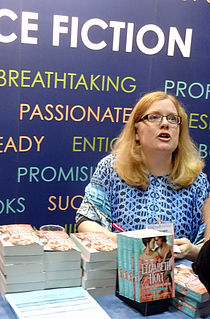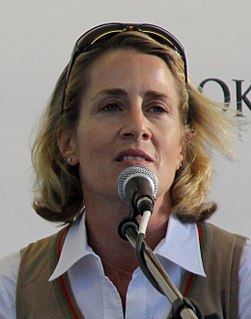A Quote by Jacques Maritain
It has never been recommended to confuse "loving" with "seeking to please"... ...Salome pleased Herod's guests; I can hardly believe she was burning with love for them. As for poor John the Baptist... ...she certainly did not envelop him in her love.
Related Quotes
Sometimes a woman's love of being loved gets the better of her conscience, and though she is agonized at the thought of treating a man cruelly, she encourages him to love her while she doesn't love him at all. Then, when she sees him suffering, her remorse sets in, and she does what she can to repair the wrong.
Griffin, please,” she whispered. “Do you want me?” he asked. “Yes!” She tossed her head restlessly. She’d explode if he didn’t give her release soon. “Do you need me?” He kissed her nipple too gently. “Please, please, please.” “Do you love me?” And somehow, despite her extremis, she saw the gaping hole of the trap. She peered up at him blindly in the dark. She couldn’t see his face, his expression. “Griffin,” she sighed hopelessly. “You can’t say it, can you?” he whispered. “Can’t admit it either.
But what I kept wondering about is this: that first second when she felt her skirt burning, what did she think? Before she knew it was candles, did she think she'd done it herself? With the amazing turns of her hips, and the warmth of the music inside her, did she believe, for even one glorious second, that her passion had arrived?
So she had to satisfy herself with the idea of love - loving the loving of things whose existence she didn't care at all about. Love itself became the object of her love. She loved herself in love, she loved loving love, as love loves loving, and was able, in that way, to reconcile herself with a world that fell so short of what she would have hoped for. It was not the world that was the great and saving lie, but her willingness to make it beautiful and fair, to live a once-removed life, in a world once-removed from the one in which everyone else seemed to exist.
If Mr. Thornton was a fool in the morning, as he assured himself at least twenty times he was, he did not grow much wiser in that afternoon. All that he gained in return for his sixpenny omnibus ride, was a more vivid conviction that there never was, never could be, any one like Margaret; that she did not love him and never would; but that she — no! nor the whole world — should never hinder him from loving her.
Did you dream of me?" he asked. "Yes," she admitted grudgingly. She had. She'd dreamed of his hands caressing her, of his mouth devouring her. His lush lips inched into a surprised but pleased smile. "You were naked," she told him. His grin spread; his eyes gleamed with satisfaction. "And tied up..." He arched his eye brows in smug expectation. "I did not know the idea of bondage would please you." "Oh, I love the idea of typing you up." She paused dramatically. "Just like in my dream, you'll be secured to an ant-hill and the little things will eat you alive.
"She (Minnie Ruth Solomon) was unusual because even though I knew her family was as poor as ours, nothing she said or did seemed touched by that. Or by prejudice. Or by anything the world said or did. It was as if she had something inside her that somehow made all that not count. I fell in love with her some the first time we ever talked, and a little bit more every time after that until I thought I couldn't love her more than I did. And when I felt that way, I asked her to marry me . . . and she said she would."
She wondered whether there would ever come an hour in her life when she didn't think of him -- didn't speak to him in her head, didn't relive every moment they'd been together, didn't long for his voice and his hands and his love. She had never dreamed of what it would feel like to love someone so much; of all the things that had astonished her in her adventures, that was what astonished her the most. She thought the tenderness it left in her heart was like a bruise that would never go away, but she would cherish it forever.
Not that she didn't love almost every boy she'd ever met, and not that every boy in the world didn't totally love her. It was impossible not to. But she wanted someone to love her and shower her with attention the way only a boy who was completely in love with her could. The rare sort of love. True love. The kind of love she'd never had.
I once picked up a woman from a garbage dump and she was burning with fever; she was in her last days and her only lament was: My son did this to me. I begged her: You must forgive your son. In a moment of madness, when he was not himself, he did a thing he regrets. Be a mother to him, forgive him. It took me a long time to make her say: I forgive my son. Just before she died in my arms, she was able to say that with a real forgiveness. She was not concerned that she was dying. The breaking of the heart was that her son did not want her. This is something you and I can understand.
She'd always known he loved her, it had been the one certainty above all others that had never changed, but she had never said the words aloud and she had never meant them quite this way before. She had said it to him, and she hardly knew what she had meant. They were terrifying words, words to encompass a world.









































